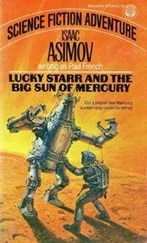The stores area was the same size as the maintenance hangar, about forty metres wide by twenty-five deep, and the beams of their lights showed a chamber filled from floor to ceiling with warehouse shelves, arranged in ordered rows with wide aisles between them. Equipment, engineering spares, and stores of all kinds filled the shelves, or sat on pallets on the floor. In most cases, the objects were too heavy to have been disturbed by the gale that had blown through here, but here and there were landslides of stores where a case had burst open and spilled its contents.
Some of the storage bays had heavy mesh cages and locked doors protecting their contents. Bergman pointed to one filled with air cylinders with a rueful smile. Matt walked further along the row, past a cage filled with spacesuits, and stopped at the next one.
‘Rescue equipment. This is what we’re after. Can I break this open?’ He looked at Abrams, who thought for a moment before responding.
‘I guess so. I don’t think any of this is implicated in the accident. Just try not to disturb anything you don’t need to.’
Matt called to the robot, which stood patiently near the doorway.
‘Bob Five! Come here!’
The robot’s armoured head swivelled round, and it started towards him, the floor thudding under its weight.
‘Here—’ Matt pointed to the hinges on the mesh door, ‘—and here.’ He indicated the lock. ‘Break, break!’ He smacked one fist into the palm of the other hand.
‘YES, MASTER,’ the robot responded. It shuffled forward, extended one of its arms, and its pincer-like hand laid hold of the top hinge. The pincer closed, shearing effortlessly through the metal, and the hinge parted with a snap. The robot moved on, cutting through the next hinge and the lock. The door fell loose with a rattle of metal, and the robot grasped it and swung it aside. Matt stepped into the enclosed area, followed by Bergman.
‘Okay, let’s pass these out.’ Matt grabbed heavy-duty flashlights, ration packs, medical kits, and a wire rope ladder, and handed them out to Bergman.
The spirits of the group rose as they shared out the haul. It seemed as if they would at least have enough food for the moment. The ration packs were bigger than the small survival packs that each of them had in their suits, and the high-energy bars and sealed packs of pastes and biscuits would keep them going for some time.
‘Is any other food kept in here?’ Clare asked, looking through the wire grille.
‘No, it’ll be in the kitchens, up in the accommodation levels – if it’s lasted,’ Matt said. He passed out some survival blankets and some spare batteries, and paused. ‘Have we got enough stuff for now? We can always come back here.’
‘Yeah, give us a few more flashlights, and can you pass out some of those rucksacks – we could do with something to carry all this stuff in.’
They stowed the food and equipment in the rucksacks, one to each person, and shouldered their loads. With more light to see by, they continued their exploration of the stores area.
Many of the aisles were filled with consumables for mining; roof props, drilling machinery and equipment, barrels of lubricating oil, rock bolts, and vast lengths of electrical cable and ventilation trunking.
There was also a vast stock of maintenance spares for the mining vehicles and visiting spacecraft. They walked past engine nozzles, landing gear struts, airlock hatches, and fuel pumps, all still sealed in their plastic coverings. A huge cutter head for a tunnel-boring machine sat in its support frame, next to a stack of giant tyres for the surface haulage trucks.
One section was devoted to spares for the army of mining robots that performed all the heavy and dangerous tasks in the mine. Matt swooped immediately on a pallet of replacement power packs, and enlisted Bergman’s help to shut Bob Five down and open the main access hatch in the robot’s body. They unlatched the depleted pack and let it crash heavily onto the floor. It took their combined efforts to lift the replacement power pack up and slide it into the robot’s body.
‘How long will that keep it going for?’ Bergman asked, as Matt closed the access hatch and restarted the robot.
‘Well, it’s fully fuelled - several days, I’d guess, depending on his activity level. We can always come back and get another one if we need to.’
‘Yeah,’ Bergman said, watching the robot come back to life. ‘It’s funny, I know he’s only a machine, but I’d be sorry if we couldn’t keep him going. If it wasn’t for old Bob Five here, we’d never have made it out of the hangar.’ He slapped the robot affectionately on its metal back as they moved off again.
As they passed down more aisles, they realised that there was more useful stuff here than they could possibly carry, and Clare told them to take only items that they would be likely to need in the next 24 hours. As she reminded them, they could always come back.
They had some debate over the electronics stores, however. Elliott discovered a store of field radio equipment, used by the roving teams of geologists who mapped the crater. As well as radios and data terminals, the kit included some folding antennas for use on the ice field.
Abrams asked if it could be used to make contact with Earth, but Wilson shook his head.
‘No, this is VHF kit; it’s the wrong frequency to try to make contact with the Deep Space Network, even if it had the power. And we’d need to be up on the crater rim to stand any chance. Might come in useful, though.’
Eventually, Clare stopped the search, and they found an empty cage and made a cache of useful equipment that they could not carry for the moment, including the field radios. She permitted a brief halt, and a little food for everyone, now that their most pressing needs had been met.
After they had rested, Clare led them out of the stores area, through the dark access ways that went from the hangars to the accommodation levels.
Nobody spoke much; they were thinking of what they were going to find there. So far, they had not encountered any bodies within the mine itself, but they all knew that the survivors had held out in the accommodation block, and their spirits, buoyed up by the find of food in the stores area, ebbed away as they walked through the echoing passages.
They were following the route that new arrivals to the mine would have taken when it was operational. From the vast hangars, the access ways ran deep into the mountain, staying roughly on the same level. More passages opened to the left and right as they walked, but the main route led straight on for about a hundred and fifty metres, before opening out into a large lobby area.
In front of them, the passage they had been following continued on its journey into the mountain. To the left, two large freight elevators lay dark and silent; these would have been used to move crew and materials to the accommodation levels above. To the right, a heavy door opened onto a set of fire stairs that climbed upwards to the accommodation levels, and downwards, to the sub-levels below the hangars.
Bergman tried pressing the elevator call button, but nothing happened, so they began the long climb up the fire stairs.
The robot was too large to manoeuvre round the turns in the staircase, or to manage the narrow risers, built for human feet, so they left it waiting in the lobby for their return.
As they climbed the staircase, the bobbing, weaving pools of their flashlights cast sudden shadows around them. The staircase rose upwards for about ten metres at a time, then reversed direction, zigzagging its way upwards into the body of the mountain.
They had been climbing upwards for about a hundred metres, when they came to a fire door that opened onto an elevator lobby similar to the one below. They spilled out into the lobby, their flashlight beams probing the darkness.
Читать дальше











